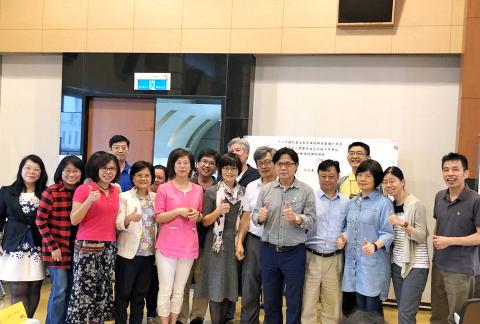The Ministry of Education’s curriculum review committee yesterday approved the 12-year national social sciences curriculum, with 34 out of the 37 members at the meeting voting in its favor.
The new curriculum would change the way students study history, moving away from rote learning and a view of history dominated by Han Chinese ideals, the committee said.
Mandatory history courses would be cut to six credits with a massive reduction in content, giving the primary focus to learning, the committee said.

Photo courtesy of the Curriculum Review Committee
Students would progress from learning about Taiwan’s history — with which they are familiar — to learning about East Asia, which would encompass Chinese history, it said.
The world history section would focus on interactions between Taiwan and the world, with the hope of allowing future generations to form a historical perspective with Taiwan at its core, the committee said.
Other social science subjects would deliver knowledge of proper social behavior, as well as logic and argumentation, while empowering the concept of “learning while doing,” it said.
The curriculum is to teach students to approach content with a critical mind to consider whose history is being taught and who wrote the account, the committee said.
Minister of Education Yeh Jiunn-rong (葉俊榮) said the passage of the curriculum was a sign that Taiwanese education was on the move, according to committee member and National Federation of Teachers’ Unions secretary-general Lee Ya-ching (李雅菁).
Student representative Hsiao Chu-chun (蕭竹均) said that if textbooks reflect the curriculum, the social sciences would no longer require rote memorization.
The curriculum would expand students’ capability to think and present arguments, as well as their ability to be upstanding citizens, Hsiao said.
Hsiao was among a group of students protesting curriculum changes in 2015, calling for greater transparency in how guidelines are changed and a more culturally diverse curriculum.

RESILIENCE: Deepening bilateral cooperation would extend the peace sustained over the 45 years since the Taiwan Relations Act, Greene said Taiwan-US relations are built on deep economic ties and shared values, American Institute in Taiwan (AIT) Director Raymond Greene said yesterday, adding that strengthening supply chain security in critical industries, enhancing societal resilience through cooperation and deepening partnerships are key to ensuring peace and stability for Taiwan in the years ahead. Greene made the remarks at the National Security Youth Forum, organized by National Taiwan University’s National Security and Strategy Studies Institution in Taipei. In his address in Mandarin Chinese, Greene said the Taiwan-US relationship is built on deep economic ties and shared interests, and grows stronger through the enduring friendship between

GAINING STEAM: The scheme initially failed to gather much attention, with only 188 cards issued in its first year, but gained popularity amid the COVID-19 pandemic Applications for the Employment Gold Card have increased in the past few years, with the card having been issued to a total of 13,191 people from 101 countries since its introduction in 2018, the National Development Council (NDC) said yesterday. Those who have received the card have included celebrities, such as former NBA star Dwight Howard and Australian-South Korean cheerleader Dahye Lee, the NDC said. The four-in-one Employment Gold Card combines a work permit, resident visa, Alien Resident Certificate (ARC) and re-entry permit. It was first introduced in February 2018 through the Act Governing Recruitment and Employment of Foreign Professionals (外國專業人才延攬及雇用法),

The Ministry of Transportation and Communications yesterday said that it would redesign the written portion of the driver’s license exam to make it more rigorous. “We hope that the exam can assess drivers’ understanding of traffic rules, particularly those who take the driver’s license test for the first time. In the past, drivers only needed to cram a book of test questions to pass the written exam,” Minister of Transportation and Communications Chen Shih-kai (陳世凱) told a news conference at the Taoyuan Motor Vehicle Office. “In the future, they would not be able to pass the test unless they study traffic regulations

EUROPEAN TARGETS: The planned Munich center would support TSMC’s European customers to design high-performance, energy-efficient chips, an executive said Taiwan Semiconductor Manufacturing Co (TSMC, 台積電), the world’s largest contract chipmaker, yesterday said that it plans to launch a new research-and-development (R&D) center in Munich, Germany, next quarter to assist customers with chip design. TSMC Europe president Paul de Bot made the announcement during a technology symposium in Amsterdam on Tuesday, the chipmaker said. The new Munich center would be the firm’s first chip designing center in Europe, it said. The chipmaker has set up a major R&D center at its base of operations in Hsinchu and plans to create a new one in the US to provide services for major US customers,